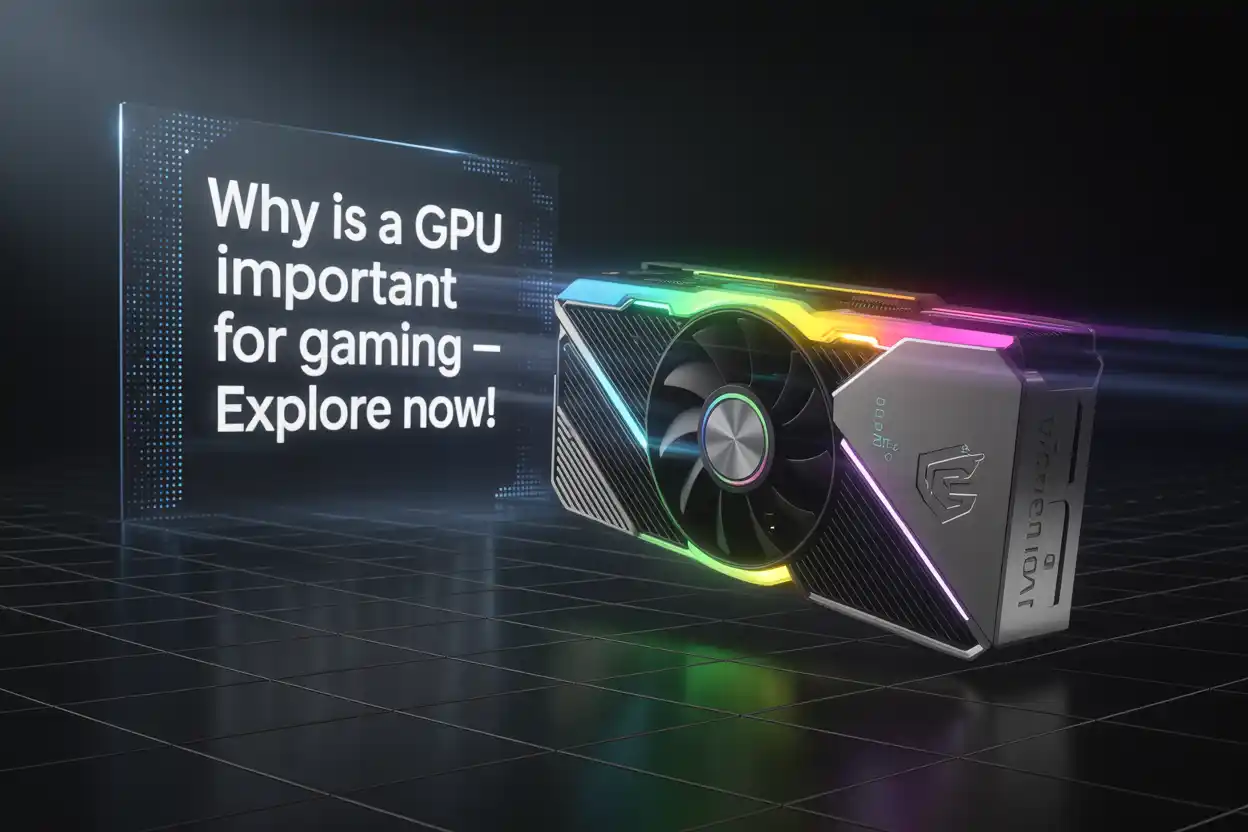The GPU is crucial for gaming because it determines how the game appears and performs. It handles things like colors, light, shapes, and movement. A good GPU makes the game smooth, fast, and clear. If the GPU is not strong, the game can slow down or stop. That’s why gamers need a good GPU.
This guide explains why a GPU is important for gaming, what it does, and how it affects your gaming experience.
What Does a GPU Do in Gaming?
A GPU runs the game’s graphics. It controls how characters, textures, and movement look on screen. It also helps games load faster and play smoothly. Without a GPU, the computer can’t show detailed visuals. That is why gaming needs a good GPU to give clear images and real-time action.
How a GPU Affects Game Performance
The GPU changes how well a game plays. A strong GPU gives more frames per second, smoother motion, and quicker response. A weak GPU makes the game slow, jumpy, or blurry. Good game speed and quality come from a GPU that keeps up with the game’s needs.
Why Graphics Quality Depends on the GPU
Graphics quality needs a good GPU because it decides how sharp and detailed the game looks. A better GPU shows clear shadows, smooth textures, and rich colors. If the GPU is weak, the game looks plain or blocky. High-quality visuals need strong graphics power.
Also Read:Where to Find GPU in Device Manager- Check GPU Now!
Role of GPU in Frame Rates and Smooth Gameplay
Here’s how a GPU affects gameplay:
- Higher frame rates = smoother motion
- Stable GPU = fewer lags or drops
- Better GPU = consistent performance in action scenes
A good GPU keeps gameplay fast and smooth without stutters or freezing.
GPU vs CPU: Which Matters More in Gaming?
| Task | GPU Role | CPU Role |
| Game graphics | Renders visuals, textures, and lighting | Minor help |
| Game physics | Helps in effects like explosions | Handles logic |
| Background system tasks | Not GPU’s job | CPU handles OS & background work |
| Overall in gaming | More impact on visuals and FPS | Supports game engine |
The GPU matters more for smooth gameplay, especially in modern games.
Do All Games Need a Powerful GPU?

Not all games need a strong GPU. Simple games, like 2D or low-detail titles, work fine on basic graphics. Big modern games with 3D worlds, high detail, or fast action need a powerful GPU. The need depends on the game’s size and graphic demands.
How GPU Impacts Online and Competitive Gaming
A strong GPU helps in:
- Faster image loading
- Smooth visuals during fast action
- Better aim and timing
- Less chance of visual delay
In competitive gaming, quick and clear visuals give you an edge.
Signs Your GPU Is Not Good Enough for Gaming
You may face problems like:
- Low frame rates
- Game crashing often
- Blurry or broken visuals
- Forced to play on low settings
- Screen freezes during action.
These are clear signs your GPU cannot handle modern games well.
Can a Weak GPU Cause Lag or Freezing?
Yes, a weak GPU often causes lag, freezing, or uneven motion. When it cannot process graphics fast enough, the game waits and drops frames. This makes the play feel bad. Upgrading the GPU usually resolves these delays and provides smoother gameplay.
How to Choose the Right GPU for Gaming Needs
To pick the right GPU:
- Check which games you play (light or heavy)
- Know your monitor resolution (1080p, 1440p, 4K)
- Set a budget range
- Match the GPU with your CPU and power supply.
- Look at trusted reviews and benchmarks.
Always buy what fits your actual gaming needs.
Is an Expensive GPU Always Better for Gaming?

Not always. Expensive GPUs have more power, but you only need that if your games or screen need it. For light or older games, a cheaper GPU works fine. Buying the most costly card without need wastes money. Choose based on real use, not price alone.
Why Gamers Upgrade Their GPU First
Gamers upgrade the GPU first because it gives:
- Better graphics and effects
- Higher FPS and smoother play
- Support for modern games
- Long-term value in performance
It’s also easier to change compared to a CPU or motherboard, making it the top choice for upgrading.
FAQs
1. Can Gaming Work Without a Dedicated GPU?
Yes, but only very light games may run. For modern or heavy games, a dedicated GPU is needed for smooth graphics and better speed.
2. What Happens If the GPU Overheats During Gaming?
If your GPU gets too hot, the game may slow down, crash, or freeze. Overheating can also damage the GPU in the long run.
3. Is a GPU Needed for Playing Games on a 4K Monitor?
Yes. 4K gaming needs a powerful GPU to show clear details and keep the game running smoothly without lag or drops in frame rate.
4. Does a Better GPU Improve Loading Times?
No. Game loading depends more on your SSD or hard drive. The GPU handles only graphics, not how fast the game starts or loads levels.
5. Is a Mid-Range GPU Enough for Modern Gaming?
Yes. Most mid-range GPUs can run today’s games at 1080p or even 1440p if you lower settings a bit. It’s good for everyday gamers.
Conclusion:
A good GPU is very important for gaming. It helps the game look nice and run fast. The GPU controls colors, light, movement, and shapes in the game. If the GPU is weak, the game can freeze, lag, or crash. That’s why gamers always buy a strong GPU first. It makes the whole gaming experience much better.

